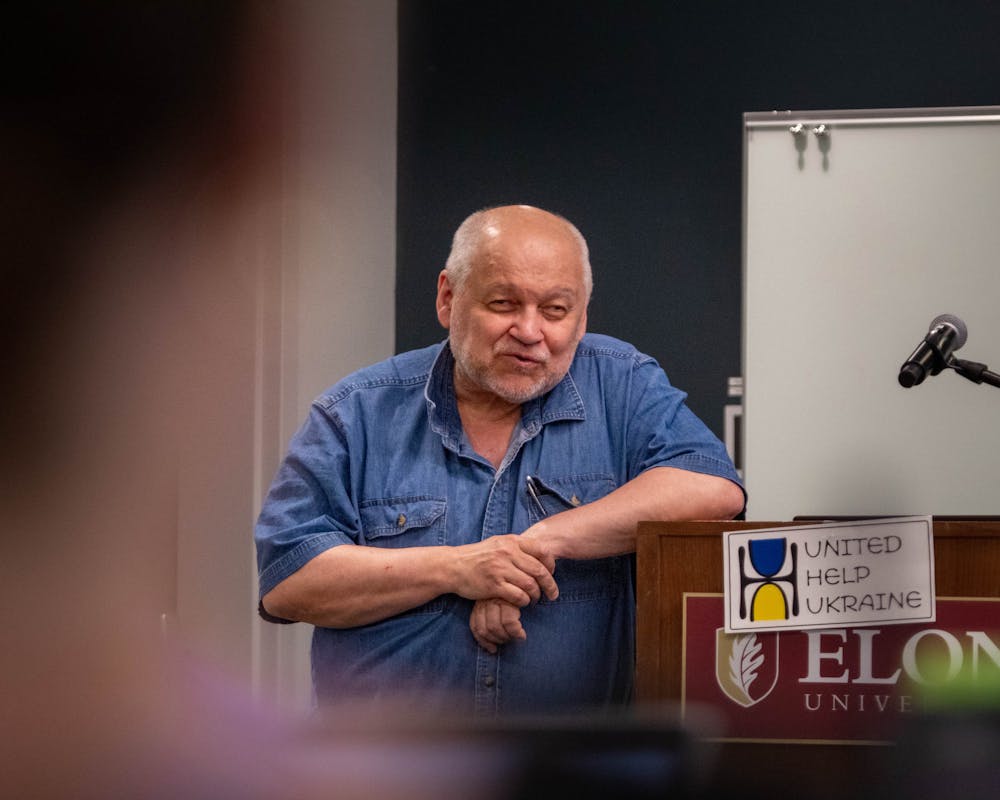In 2014, journalist and novelist Yuriy Lukanov was reporting from Kramatorsk, Ukraine. He remembers trying to open a bottle of red wine with friends that they bought from the only store open in the deserted city. They couldn’t find a corkscrew and ended up using a cleaning rod to push the cork into the bottle and enjoy the wine. To him, this was more than an inconvenience. It is a metaphor for how disruptive war can be.
Lukanov told this story during a presentation he gave hosted by the Love School of Business and Vitaliy Strohush, Elon professor of economics. Lukanov emphasized the dangers of a censored press in Russia and the role novels can play in honest and creative storytelling.
Elon sophomore Hunter Siegel was in the audience and said the wine and cork story resonated with him.
“I think it showed humanity, and one of the main points is that not everything can be wrapped up in a report. That there is a human aspect underneath it all — something that is very easy to forget,” Siegel said.
Siegel is a political science and international global studies double major. He tries to listen to as many speakers as he can because he likes learning outside the classroom.
“It puts all of this abstract knowledge that many people at Elon have and is taught in many political science and international and global studies classes into its proper life context,” Siegel said.
While Lukanov thought it would be unprofessional for him to print this story in the newspaper, he thought it was a small window into a bigger issue — how little habits were altered by the war. Lukanov said that’s why he decided to write fiction and finds that it allows for more creativity, inclusion and expression. Lukanov’s visit to campus is a part of his book tour for his new novel, “Reporter Volkovsky.”
During his presentation, Lukanov tried to bring context to the current war in Ukraine. He said it’s rooted in the annexation of Crimea in 2014 where Russia successfully took the Crimean Peninsula from Ukraine. It was then Lukanov noticed the influence of Russian censorship in the media when Russia used propaganda to paint a false picture of Ukraine.
“They are attacking free journalism. They are destroying freedom of speech. They are destroying opportunity to receive truthful information,” Lukanov said.
This incident prompted him to write his first book, “The Press: How Russia Destroyed Media Freedom in the Press.” He wants people to notice the censorship as he did.
“You have a right to listen what whomever you want, but usually, Russians lie. Listen, other nations — Lithuanians, Latvians, Estonians, Georgians, Maldovians, and so on, and other nations who were a part of the Soviet Union — and Russians describe them as miserable nations. But in fact, many of them … have cultural, which is much deeper than Russian culture,” Lukanov said.
Lukanov also said the misinformation he sees in Ukraine now is more aggressive than what he saw when he first entered the field of journalism.
“I would say when I [am] watching their television it is absolutely stupid now,” Lukanov said. “It's absolutely stupid, not flexible, absolutely brutal.”
Yet, he said Ukrainians are getting better at recognizing it as propaganda, so Russia’s agenda isn’t as effective as it once was. Still, Lukanov said Ukranians must fight against it as best they can.
Elon junior Taylor Barbadora is a journalism major and came to hear Lukanov speak as a part of her JOU 3100: Reporting for the Public Good class. She said she was surprised to learn how much censorship there is in Russia.
“It was sad to hear but really interesting to see the difference and hear how it is,” Barbadora said. “I was trying to put myself in the shoes of someone who lives in Russia and is going through that and things being fed to you so strategically is really hard to think about.”
Censorship and propaganda are two ways to control the narrative, according to Lukanov, but the other way Russia is doing it is by going after journalists directly. In the last 31 years, 82 journalists have died in Russia according to the Committee to Protect Journalists. At least 38 of them were murdered.
Lukanov said he would like to see Putin punished for these murders and other crimes, but he thinks it is only possible if the rest of the international community can be united behind that goal. He said Russia’s ambitions must be stopped.
“Their high mission is to renew the Soviet empire,” Lukanov said. “I think the democratic world should provide, should continue to provide, sanctions against Russians to make them give up their nuclear weapons and so on and so on.”


